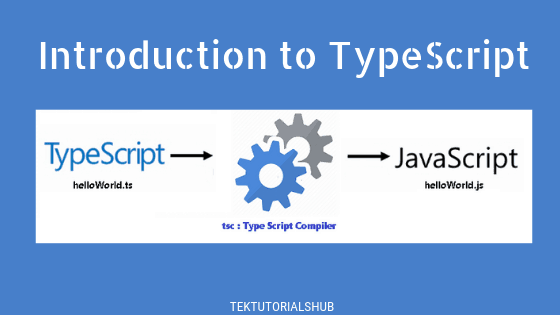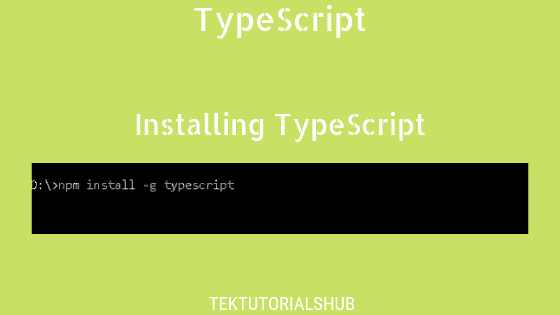The void data type in Typescript represents the return value of functions that don’t return a value or return statements that do not return anything.
Table of Contents
Void Data Type
In the following example, someFunc1 does not have a return statement. someFunc2 does have a return statement but does not return anything. In such cases, the Typescript infers the type as void.
1 2 3 4 | function someFunc1() { //Inferred return is Void } |
1 2 3 4 5 6 | function someFunc2() { //Inferred return is Void return } |
You can also annotate the return type explicitly to void.
1 2 3 4 | function someFunc(): void { } |
Assigning to void
Nothing is assignable to void except for void, undefined, null, any & never. You can assign null to void only if strictNullChecks is set to false in tsconfig.json
1 2 3 4 | let a:void a=undefined //No Error |
You cannot assign any other value to it. It will throw a Type is not assignable to type ‘void’ error.
1 2 3 4 | a:void a="test" //Type 'string' is not assignable to type 'void'. |
But you cannot assign void to undefined
1 2 3 4 5 6 7 8 | let a:undefined; let b:void; b=a; //ok a=b; //Type 'void' is not assignable to type 'undefined' |
Functions in JavaScript return undefined if they do not return any values.
1 2 3 4 5 6 7 | function someFunc() { } let a = someFunc() console.log(a) //undefined |
To assign null, first, make the strictNullChecks false in tsconfig.ts. Remember that making it false is not a recommended practice.
1 2 3 4 5 6 7 | { "compilerOptions": { "strictNullChecks": false }, } |
1 2 3 4 | let a:void a=null //ok |
Vs Any
You can also assign variable of any type to a void variable.
A variable of any type can be assigned to anything. This is because the compiler switches type checking when any is involved.
Vs never
The never type looks very similar to void.
We use void when the function does return but does not return a value. The typescript infers the return value as void. Use never return type when the function does not return at all.
You can refer to the article void Vs never.
Void as a function parameter
You can use void as the function parameter. The only valid values that you can pass are void, undefined & null (strictNullChecks is set to false in tsconfig.json)
1 2 3 4 5 6 7 8 9 10 11 12 | function someFunc(x:void) { } someFunc() //ok someFunc(undefined) //ok someFunc(null) //ok if strictNullChecks=false |
The underlying JavaScript neither has a data type void nor value.
The void data type can hold only one value, i.e., undefined (or null if the strictNullChecks compiler option is off). That is because JavaScript returns a value undefined when the function returns no value.
Why use void
When you know that the function does not return any value, then it is better to annotate it with the void. This will prevent you from accidentally returning a value.
1 2 3 4 5 | function voidFunction():void { return 10; //Type 'number' is not assignable to type 'void' } |
It also prevents you from storing and doing something with the return value.
1 2 3 4 5 6 7 8 9 | function voidFunction(): void { } let v = voidFunction(); v.boo; // Property 'boo' does not exist on type 'void' v + 20; // Operator '+' cannot be applied to types 'void' and 'number |
Similarities with Undefined
But you can also use undefined instead of void with the same effect.
1 2 3 4 5 | function voidFunction():undefined { return 10; //Type 'number' is not assignable to type 'undefined' } |
1 2 3 4 5 6 7 8 9 10 | function voidFunction():undefined { return undefined; } let v = voidFunction(); v.boo; // Property 'boo' does not exist on type 'void' v + 20; // Operator '+' cannot be applied to types 'void' and 'number |
void vs undefined
The above examples make it appear that void is almost similar to undefined. But they have one difference.
If a function type specifies return type void when implemented, it can return any other value, but it will be ignored. The behavior is helpful for advanced callback patterns.
For Example, let us create a function type voidFunc, whose return type is void.
1 2 3 | type voidFunc = () => void; |
Now let us create three functions of type voidFunc (f1,f2 & f3). f1 returns a number, f2 returns a boolean, and f3 returns a string. Although the voidFunc returns void, the Typescript compiler does not enforce f1, f2 & f3 functions to return void but ignores them. But it still infers the return type of these functions as void.
i.e., Although v1 has value 10 the compiler treats it as type void and hence does not allow us to use it for any operations.
1 2 3 4 5 6 7 8 9 10 11 12 13 14 15 16 17 18 19 20 21 22 23 24 25 26 27 28 29 30 31 32 33 34 35 36 37 38 39 40 41 42 43 | type voidFunc = () => void; const f1: voidFunc = () => { return 10; }; const f2: voidFunc = () => true; const f3: voidFunc = function () { return "Hello"; }; //v1, v2 & v3 are of type void const v1 = f1(); const v2 = f2(); const v3 = f3(); console.log(v1) //10 console.log(v2) //true console.log(v3) //hello //Since v1,v2 & v3 are voids you cannot use them v1+10; //not ok //Operator '+' cannot be applied to types 'void' and 'number' (v1 as number)+10 //not ok //Conversion of type 'void' to type 'number' may be a mistake //because neither type sufficiently overlaps with the other. //If this was intentional, convert the expression to 'unknown' first. |
Change the type to undefined and the compiler complaints. Since the voidFunc returns undefined, the Typescript compiler also expects a function f1 to return undefined.
1 2 3 4 5 6 7 8 9 10 11 | type voidFunc = () => undefined; const f1: voidFunc = () => { return 10; }; //Type '() => number' is not assignable to type 'voidFunc'. //Type 'number' is not assignable to type 'undefined' |
The code above also works with the any, but it defeats the purpose using TypeScript.
1 2 3 | type voidFunc = () => any; |
You can also use an unknown type.
1 2 3 | type voidFunc = () => unknown; |
void is pretty useful in callback functions, which might return some value.
1 2 3 4 5 6 7 8 9 10 11 12 13 14 15 16 | function doSomeNumberCrunching(): number { return 42; } function doSomeStringCrunching(): string { return "Hello"; } function callMe(callback: () => void) { callback(); } let b = callMe(doSomeNumberCrunching); let c = callMe(doSomeStringCrunching); |
References
Read More
- TypeScript Tutorial
- Typescript Type System
- Type Annotations in TypeScript
- Type Inference in typescript
- Number Data Type
- NaN in Typescript
- Min, Max & Safe Values
- EPSILON & Floating Point Precision
- Infinity
- BigInt data type
- BigInt Vs Number
- Boolean Data Type
- Null
- Undefined
- StrictNullChecks
- Null Vs Undefined
- Object & Object Data Type
- Never Type
- Void Type
- Unknown Type



“You cannot assign any other value to it.”
– Actually we do can assign “any” type to void. We can assign “any”, “void”, “undefined” and even “never”. Also “null” if strictNullChecks: false.
let a:void
a=”test” as any
Thanks Updated the article